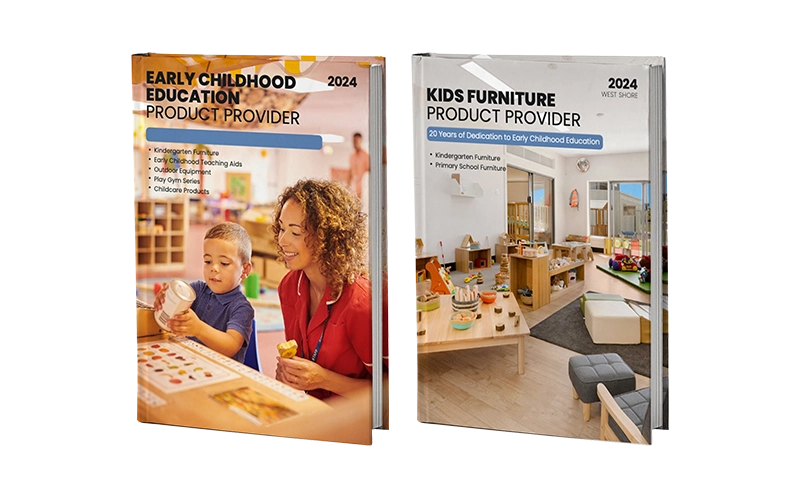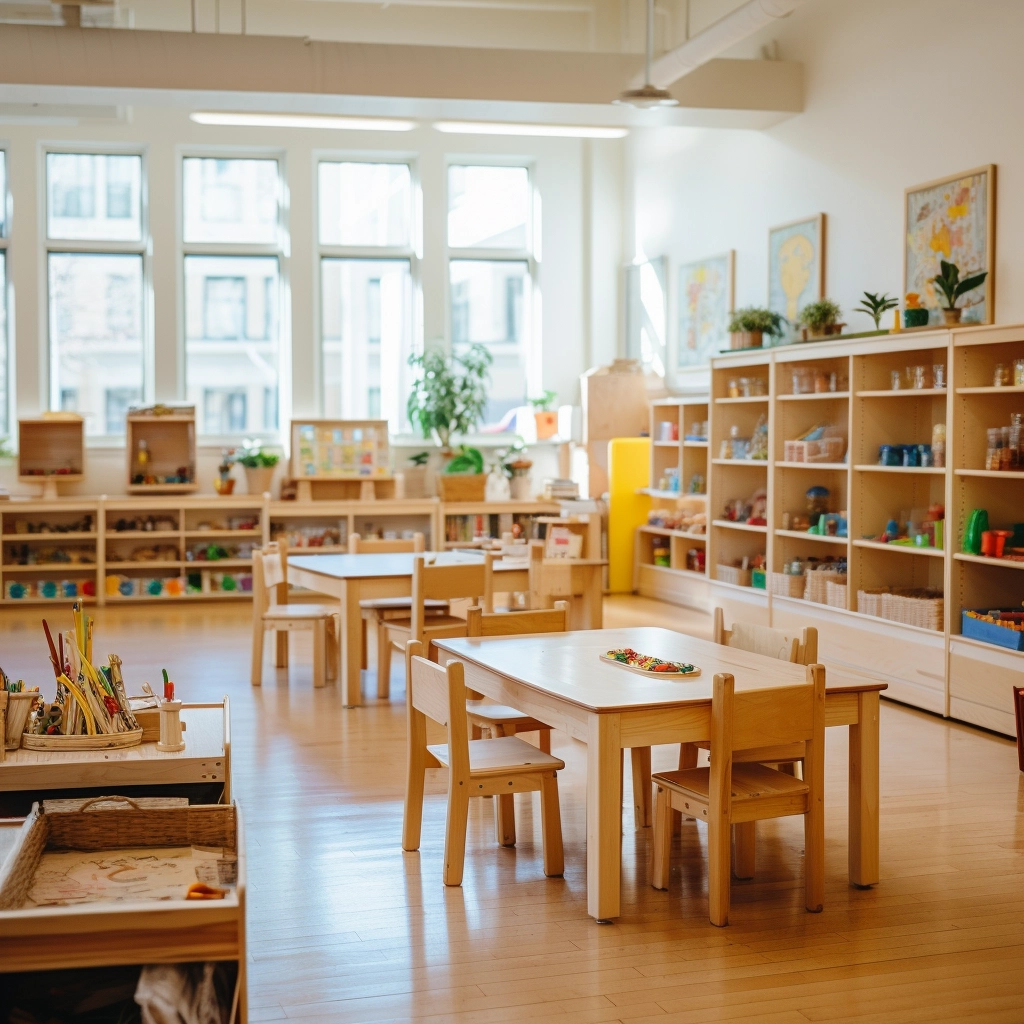Are you struggling to choose between a Montessori school and a traditional daycare? Wondering how Montessori childcare near me compares to the best daycare options in your area?
Both Montessori and daycare offer early learning environments, but they serve different purposes. Montessori encourages independence and structured learning; daycare provides flexible care and social play. Your decision depends on your child’s personality, your schedule, and long-term education goals.
In this article, I’ll walk you through the pros and cons of each system, using my experience working with hundreds of Montessori schools and daycare centers globally.

Montessori vs Daycare: Understanding the Fundamentals
What Is a Montessori School?
A Montessori school follows the globally recognized teaching philosophy of Dr. Maria Montessori. It emphasizes independent exploration, self-paced learning, and respect for the child’s natural psychological development.
These environments are not theory-based; they’re actively shaping education across the globe. For example, our clients like American Capstone Montessori School in the U.S. Und Singapore HGE Montessori Preschool have successfully implemented full Montessori curricula supported by our custom preschool furniture and learning tools. Their classrooms reflect true Montessori principles—minimalist, orderly, and child-centered.
Parents searching for Montessori school meaning or Montessori preschools near me often want this kind of structured learning model that builds not just academic ability but real-life skills.


Key benefits: independence, focus, early academic foundation, life skills
What Is a Daycare?
By contrast, a daycare—sometimes referred to as a creche—focuses primarily on childcare and supervision, not structured education. That doesn’t mean it’s without value. A quality daycare can foster emotional development, social skills, and routine management for children under 5.
Some of our global clients run well-managed daycare centers, such as Froebel’s Daycare Und Totri Daycare, where the priority is safety, social interaction, and responsive care. These centers often attract parents searching for best daycare or daycare with STEM programs that offer foundational learning without academic pressure.


Key benefits: flexible care, social growth, emotional support, daily structure
What Is a Montessori Daycare?
Now, here’s where things merge.
A Montessori daycare blends the structured self-learning methods of Montessori with the flexibility and nurturing care of traditional daycare. Children follow routines (meals, naps, outdoor time), but they also engage in age-appropriate Montessori activities.
We’ve worked with centers like Mar Vista Montessori & Infant Care Center in California Und Montessori Learning Center Hong Kong, both of which adopt this hybrid model. These schools emphasize independence and routine simultaneously—perfect for busy parents seeking both cognitive development and reliable care.
When parents search online for Montessori daycare near me or Montessori infant care near me, they’re usually looking for this hybrid system. It’s becoming increasingly popular, and as suppliers, we’ve seen a steady rise in demand for Montessori room setups that blend comfort and learning functionality.


Montessori vs Daycare: A Brief Overview
When parents compare Montessori vs Daycare, they often think it’s just about education vs babysitting—but the reality is far more nuanced. Let’s take a step back and quickly compare what each environment offers at a glance.
| Merkmal | Montessori School | Daycare | Montessori Daycare |
|---|---|---|---|
| Core Focus | Independent learning, holistic development | Supervised care, social play | Learning + care hybrid |
| Learning Approach | Child-led, hands-on, structured | Adult-directed, flexible | Balanced—Montessori materials within flexible schedules |
| Age Range | Typically 0–6 years | 0–5 years | 0–6 years |
| Lehrplan | Montessori-specific materials and lesson plans | Varies by center, not always structured | Montessori tools within daycare schedule |
| Teacher Qualification | Montessori-certified educators | General childcare certification | Some Montessori training preferred |
| Unterrichtsumgebung | Calm, minimalist, child-sized, real materials | Montessori tools within the daycare schedule | Hybrid design: learning centers with relaxation spaces |
| Schedule Type | Structured with blocks of uninterrupted work time | Flexible (meals, naps, playtime) | Partially structured with care routines |
| Best For Parents Who | Value academic prep and independence | Need flexible, reliable care during work hours | Want both development and care in one location |
| Kosten | Often higher due to certification and material standards | Varies, often more affordable | Colorful, energetic, and more toys |
Parents typing “difference between preschool and daycare” or “Montessori vs Daycare” into Google often don’t realize there’s a middle ground—and that middle ground is usually where the best results happen, especially for families looking for a Montessori childcare near me that also provides full-day care.
Some Montessori daycares—like Montessori Learning Center Hong Kong or A Place to Grow Montessori—take the core Montessori principles and apply them in a care-first format. The result? Children learn through play, but with intention and structure. It’s not chaotic; it’s calm, inviting, and designed to develop self-confidence.

12 Key Differences Between Montessori and Daycare
1. Educational Philosophy
Montessori: Montessori schools are built on the philosophy that children learn best when they are allowed to explore freely in a structured, prepared environment. The goal is to foster independence, curiosity, and a lifelong love of learning, guided by the child’s own developmental pace.
Daycare: Daycares, on the other hand, are primarily designed to provide safe and nurturing care during working hours. While some include educational content, the philosophy is more focused on supervision, socialization, and daily routines rather than formal education.
This difference shapes everything from classroom setup to teacher interaction. Montessori encourages self-driven discovery, while daycare emphasizes group harmony and basic care, making Montessori more suitable for early cognitive development and daycare more flexible for family logistics.

2. Classroom Environment
Montessori: Montessori classrooms are calm, organized, and minimalist. Each area is intentionally designed for independent activity, with child-sized furniture, natural materials, and clearly defined workspaces. Distractions are minimized to support deep focus.
Daycare: Daycare classrooms tend to be lively, colorful, and play-based. They are often filled with toys, posters, and group activity stations. While stimulating, these environments can be more chaotic and less structured.
This contrast impacts how children learn to manage focus and internal calm. Montessori fosters a sense of order and self-control, while daycare promotes social engagement and external stimulation.
3. Age and Grade Level
Montessori: Montessori schools typically have multi-age classrooms: for example, 0–3 (infant/toddler), 3–6 (primary), and 6–9 (lower elementary). This fosters peer mentoring, leadership, and collaborative learning among children of different abilities.
Daycare: Daycares usually divide children strictly by age—6 months, 1 year, 2 years, etc.—and adjust activities accordingly. Groups are more uniform in age and developmental stage.
This difference significantly affects the social development of the child. Multi-age classrooms encourage diversity in thinking and empathy; daycare groupings may feel more peer-equal but offer less variety in role models and learning relationships.
Möchten Sie einen Raum gestalten, der zum Lernen anregt? Kontaktieren Sie uns, um individuelle Möbellösungen zu entwickeln, die auf die Bedürfnisse Ihres Klassenzimmers zugeschnitten sind.
4. Learning Materials
Montessori: Montessori schools use specialized educational materials designed to isolate specific concepts such as size, shape, texture, and volume. These are hands-on, purposeful tools, not toys, and are made from natural materials like wood and metal.
Daycare: Daycares rely more on general toys and games that promote socialization and basic motor skills. While some may introduce puzzles or alphabet cards, they are not systematically designed for progressive learning.
This makes Montessori more effective for skill-building and conceptual understanding, while daycare materials are better for entertainment and group interaction.

5. Flexibility
Montessori: Montessori programs usually require consistent attendance to preserve the child’s routine and support uninterrupted learning. Schedules are more fixed, with set arrival times and expectations for attendance.
Daycare: Daycares are known for their flexibility, offering part-time, full-time, and drop-in services. They’re designed to accommodate working parents and changing schedules.
This difference makes daycare ideal for families with variable work hours, while Montessori suits those seeking a stable, long-term educational structure.
6. Self-Directed Learning
Montessori: In Montessori settings, children are encouraged to choose their work, repeat tasks, and follow their natural interests. Teachers observe and guide only when needed, allowing the child to build independence.
Daycares often use group-led activities with structured play and adult instruction. Children are directed on what to do and when, limiting self-directed exploration.
This makes Montessori particularly effective in developing initiative and decision-making, while daycare supports routine and external instruction.
Möchten Sie einen Raum gestalten, der zum Lernen anregt? Kontaktieren Sie uns, um individuelle Möbellösungen zu entwickeln, die auf die Bedürfnisse Ihres Klassenzimmers zugeschnitten sind.
7. Lesson Planning
Montessori: Montessori teachers create individualized learning paths for each child. Plans are tailored based on detailed observation and adjusted to match each child’s pace and readiness.
Daycare: Daycare programs follow general activity plans, usually organized around themes, seasons, or holidays. Activities are group-based and designed to be entertaining and straightforward.
The Montessori method results in personalized educational progress, whereas daycare provides general exposure to basic ideas in a communal setting.
8. Noise Level
Montessori: Montessori classrooms maintain a quiet and peaceful atmosphere where children are focused on their tasks. Movement is deliberate, and voices are kept soft to respect the work of others.
Daycare: Daycares tend to be louder and more dynamic, with music, group play, and higher levels of background noise as children engage in various activities.
This difference can affect sensory regulation and concentration, with Montessori offering a calm space ideal for focused learners and daycare offering a vibrant space for high-energy interaction.
9. Social and Emotional Development
Montessori: Montessori encourages natural socialization through shared materials, mixed-age mentoring, and conflict resolution without adult interference. Children learn empathy and communication in real-life contexts.
Daycare: Daycares foster group participation through structured activities like circle time, songs, and games. Adults often mediate disputes and organize group play to teach cooperation.
Both systems promote emotional growth, but Montessori emphasizes self-awareness and peer learning, while daycare supports guided social interaction.

10. Teacher’s Responsibilities
Montessori: Montessori teachers act as facilitators and observers. Their role is to guide learning gently, respect each child’s process, and step back to allow for independent discovery.
Daycare: Daycare teachers are active supervisors and group leaders, responsible for managing behavior, maintaining schedules, and ensuring safety and participation.
This results in different learning dynamics: Montessori teachers foster internal motivation, while daycare teachers manage through external structure and guidance.
11. Academic Achievement
Montessori: Montessori introduces academic subjects early using concrete, hands-on materials. Children may begin reading, writing, and doing math before age 5 through purposeful activities.
Daycare: Daycares may introduce letters, numbers, and colors casually, but academic progress is not a central focus. Activities are often more exploratory than skill-based.
For parents prioritizing early cognitive development, Montessori often provides a stronger academic foundation than daycare.
12. Preparation for Life After Graduation
Montessori: Montessori focuses on life skills, self-regulation, and independence. Children learn to prepare their snacks, clean up after themselves, and manage time.
Daycare: Daycares prepare children for group learning environments, teaching them how to follow instructions, wait their turn, and participate in group routines.
Montessori tends to prepare children better for self-driven learning and adaptability, while daycare builds skills for structured school environments and teamwork.
Similarities of Montessori and Daycare
While there are many apparent differences between Montessori vs Daycare, both systems share foundational goals when it comes to supporting early childhood development. Despite using different methods, they intersect in several meaningful ways.
1. Focus on Early Childhood Care and Development
Both Montessori schools and daycares are designed to serve children during the most critical years of development, typically from birth to six years old. At this stage, a child’s brain is rapidly forming connections, and both environments aim to nurture that growth.
Each system supports:
- Physical development
- Language acquisition
- Emotional regulation
- Basic cognitive and social skills
Though their teaching strategies differ, both environments are built around the belief that early experiences shape future success.
2. Emphasis on Social Interaction
Children in both Montessori and daycare settings are given opportunities to interact with peers, practice cooperation, and build social-emotional intelligence. While Montessori encourages socialization through shared responsibilities and peer mentoring, daycare promotes group interaction through play and teacher-led activities.
In both models, children learn to:
- Share
- Communicate
- Resolve conflicts
- Build friendships
This helps children develop the confidence and empathy necessary for future group learning and relationships.
3. Trained Staff Who Care About Children
Whether in a Montessori school or a daycare center, staff members are trained in early childhood development and are committed to the safety and well-being of the children.
Montessori teachers complete specialized training focused on observation and individualized learning. Daycare caregivers often hold certifications in early childhood education and safety standards.
Though their roles differ, both types of educators are dedicated to providing a nurturing, respectful, and responsive learning environment.
How to Choose Between Montessori vs Daycare
Choosing between Montessori vs Daycare isn’t just about comparing two educational systems—it’s about aligning your child’s personality, your family’s needs, and your long-term goals with the right environment.
Here’s a practical framework to guide your decision.
1. Understand Your Child’s Personality
Some children thrive in a calm, structured setting where they can concentrate deeply and work independently. Others are more energetic, social, and may need a louder, more flexible environment to feel stimulated.
- Montessori may be ideal for children who are naturally curious, focused, or who enjoy working alone.
- Daycare may be better suited for children who are high-energy, highly social, or need more guided structure.
There’s no one-size-fits-all solution—observe how your child behaves in different environments to help guide your choice.
2. Consider Your Family’s Schedule and Needs
Montessori schools often require fixed attendance schedules and may not offer extended hours, drop-in care, or complete flexibility. In contrast, daycares are designed for working parents and offer part-time or full-time care with more flexible arrangements.
If you need:
- Early drop-off
- Late pick-up
- Backup care for irregular work hours
Then a daycare—or a Montessori daycare hybrid—might be the most realistic option.

3. Think About Your Educational Priorities
Do you want your child to start reading, writing, and doing math before age five? Is self-directed learning a priority? Or are you more focused on safe, reliable care while your child develops socially?
- Montessori emphasizes early academic foundation, critical thinking, and independence.
- Daycare focuses more on caregiving, group interaction, and social-emotional readiness.
If you want both, look into daycare or Montessori school daycare options that blend care with educational structure.
4. Budget and Cost Comparison
Cost is a significant factor. Montessori programs are often more expensive due to certified teachers, specialized materials, and lower student-teacher ratios.
- Daycare costs vary widely but are generally more affordable than complete Montessori programs.
- Hybrid Montessori daycares often fall in the mid-range.
Be sure to compare total expenses, including:
- Monthly tuition
- Registration fees
- Supply or material fees
- Extended care options
Doing a day care cost comparison helps you plan realistically and avoid surprises.
5. Check Accreditation and Standards
Not every school using the term “Montessori” follows accurate Montessori methods. Look for programs accredited by recognized Montessori organizations, and ask about staff qualifications and curriculum structure.
Similarly, ensure the daycare you’re considering meets local licensing and safety standards, has clear policies, and uses developmentally appropriate practices.
A good question to ask is:
- “How do you define Montessori?”
- “What does your daily routine look like?”
- “How is progress tracked and communicated?”
These answers will help you distinguish between authentic Montessori and marketing buzzwords.
6. Visit and Observe
The best way to make a decision is to visit the schools in person.
During a tour, look for:
- Classroom organization and cleanliness
- Teacher-child interactions
- Child engagement levels
- Noise levels and emotional tone
Whether you’re visiting a Montessori nursery near me or a STEM daycare near me, firsthand observation will tell you far more than any brochure or website.
7. Trust Your Instinct and Ask Your Child (If Appropriate)
If your child is old enough, involve them in the decision. Visit both environments and observe how they respond. Do they seem calm, excited, overwhelmed, or withdrawn?
Also, trust your instinct as a parent. Often, your gut reaction after a school visit will tell you whether the place aligns with your values and your child’s temperament.
Ultimately, both Montessori and daycare environments offer children opportunities to grow, but in different ways. Choosing the right path means finding the best fit, not necessarily the best label.
What’s the Difference Between Opening a Montessori School vs a Daycare?
Opening a Montessori school and launching a daycare center may seem similar on the surface—both serve young children, require child-safe environments, and need qualified staff—but in reality, the business models, licensing, staffing, and space planning requirements are quite different.
Here’s a breakdown of the most critical differences.
1. Curriculum and Licensing Requirements
To open a Montessori school, you’ll likely need to follow Montessori accreditation guidelines, which require:
- Montessori-certified teachers
- Approved curriculum materials
- Adherence to classroom layout standards
- Observation-based student assessments
A daycare, in contrast, usually operates under fundamental childcare licensing laws in your local region. Curriculum is optional, and while learning is encouraged, it’s not required. The regulatory bar for curriculum structure is lower.
This means opening a Montessori school often takes more planning, staff training, and curriculum development, while a daycare can be launched more quickly and with fewer formal educational constraints.

2. Startup Investment and Furniture Requirements
Montessori classrooms require specialized furniture and materials that align with the philosophy. Items must be:
- Child-sized
- Real (not pretend) tools
- Organized by subject area
- Presented in a specific way
Montessori classrooms typically include:
- Practical life shelves
- Sensorial materials
- Math and language stations
- Reading corners and peace areas
Daycare centers can be outfitted with more general-purpose toys, soft furniture, and large activity zones. Furniture choices are more flexible and less tied to educational philosophy.
From our factory’s perspective, we find that outfitting an actual Montessori classroom requires a 20–40% higher investment per classroom, but this investment directly supports the premium nature of the school.

3. Staff Qualifications
A Montessori school requires teachers who are trained and certified in Montessori education (e.g., AMI, AMS). These educators must understand:
- Child observation
- Lesson presentation
- Classroom material rotation
- Mixed-age group management
Daycare staff usually need general early childhood education certificates, CPR training, and background checks. No Montessori-specific certification is required unless branding as such.
This affects your recruitment strategy, payroll planning, and HR structure.
4. Parent Expectations and Pricing Strategy
Parents who enroll their children in a Montessori school often expect:
- Structured academic development
- Professional communication
- Long-term results and early academic readiness
They are generally willing to pay higher tuition for a Montessori experience.
Daycare parents tend to prioritize:
- Flexibility
- Sicherheit
- Reliability
- Affordability
Daycare pricing is often more competitive, and the enrollment turnover is higher due to part-time and temporary arrangements.
5. Space Design and Regulation
Montessori classrooms must follow specific layout guidelines, including:
- Defined work zones
- Uncluttered visual lines
- Floor mats and low shelves
- Access to real-life tools
In daycare centers, the layout can be more play-centric, with:
- Soft flooring for safety
- Large play structures
- Group activity areas
- Nap zones with cots or cribs

Regulatory bodies often have different codes and inspections for educational vs care environments, so your construction and compliance process may vary depending on the model.
6. Branding and Market Positioning
Launching a Montessori school positions you in the premium early education market. Your brand is associated with academic rigor, global recognition, and structured development.
Launching a daycare positions you in the childcare and services market, where your strength lies in convenience, community trust, and flexibility.
This choice affects everything from:
- Your marketing language
- Website design
- Parent engagement
- Furniture catalog (e.g., Montessori-specific pieces vs. daycare multifunctional furniture)
Summary: Which Model Is Right for You?
| Aspekt | Montessori School | Daycare Center |
|---|---|---|
| Curriculum Requirements | High – Certified materials & methods | Low – Optional or flexible |
| Furniture Needs | Specific, philosophy-aligned | General-purpose, play-focused |
| Teacher Training | Montessori-certified educators | General childcare staff |
| Startup Costs | Higher due to materials/training | Lower entry barrier |
| Parent Expectations | Structured learning, long-term growth | Safe, flexible, reliable care |
| Revenue Potential | Higher per-child tuition | Higher volume, lower per-child cost |
| Market Positioning | Premium early education | Highly certified materials & methods |
FAQs about Montessori vs Daycare
What are the disadvantages of Montessori or daycare?
Montessori disadvantages:
- Less flexible for working parents due to strict schedules
- Higher cost due to certified staff and specialized materials
- May not suit highly energetic or group-oriented children
Daycare disadvantages:
- Less focus on structured education
- Larger group sizes can reduce individual attention
- The environment may be overstimulating or chaotic for sensitive children
Choosing between Montessori vs daycare means weighing your child’s personality and your family’s daily needs.
Is Montessori for the wealthy?
Not necessarily. While authentic Montessori programs often come with higher tuition fees due to:
- Specialized furniture
- Certified educators
- Lower student-teacher ratios
…many communities now offer public Montessori options, Montessori daycare hybrids, or partial Montessori approaches to make it more accessible. Montessori is a philosophy, not a luxury brand—but implementing it with fidelity does come at a cost.
Do Montessori schools have better outcomes?
Studies suggest that Montessori students often:
- Develop stronger problem-solving and independence
- Show earlier literacy and math skills
- Exhibit higher emotional regulation and social responsibility
However, outcomes depend on:
- Program authenticity
- Teacher training
- Family involvement
So while Montessori can offer a strong early foundation, it isn’t a guaranteed predictor of long-term success without the proper context.
Why does Montessori discourage praise?
Montessori education promotes intrinsic motivation—the idea that children learn for the joy of discovery, not for external rewards. Overuse of praise like “Good job!” can:
- Shift focus to adult approval
- Limit risk-taking and exploration
- Encourage performance over process
Instead, Montessori educators use observational feedback, such as:
- “You worked very carefully on that.”
- “I noticed you helped a friend without being asked.”
This approach helps children build confidence from within, not from external validation.
How do I know if a Montessori program is authentic?
Ask these key questions:
- Are teachers trained by recognized Montessori institutions (e.g., AMI, AMS)?
- Are classrooms multi-age and designed for uninterrupted work cycles?
- Are the materials specific to Montessori, not general toys?
- Is learning self-directed and observation-based?
- Are rewards, punishments, and worksheets minimized?
A genuine Montessori program will meet most or all of these criteria. Be cautious of programs using the name “Montessori” without following the core principles.
A Clear Path Forward: Montessori vs Daycare in Perspective
Montessori vs Daycare is not a matter of right or wrong—it’s a matter of fit. The choice depends on whether you value independence and early academic structure, or flexibility and play-based care. Each model offers benefits when matched with the right child and the right intention.
No matter which path you choose—be it a full Montessori children’s center or a flexible daycare school—what truly elevates the learning experience is the environment itself. With well-designed classrooms, child-centered layouts, and durable furniture that supports development, even subtle differences in setup can shape outcomes. That’s why trusted providers like West Shore Möbel continue to support schools worldwide in creating spaces where philosophy meets function.






